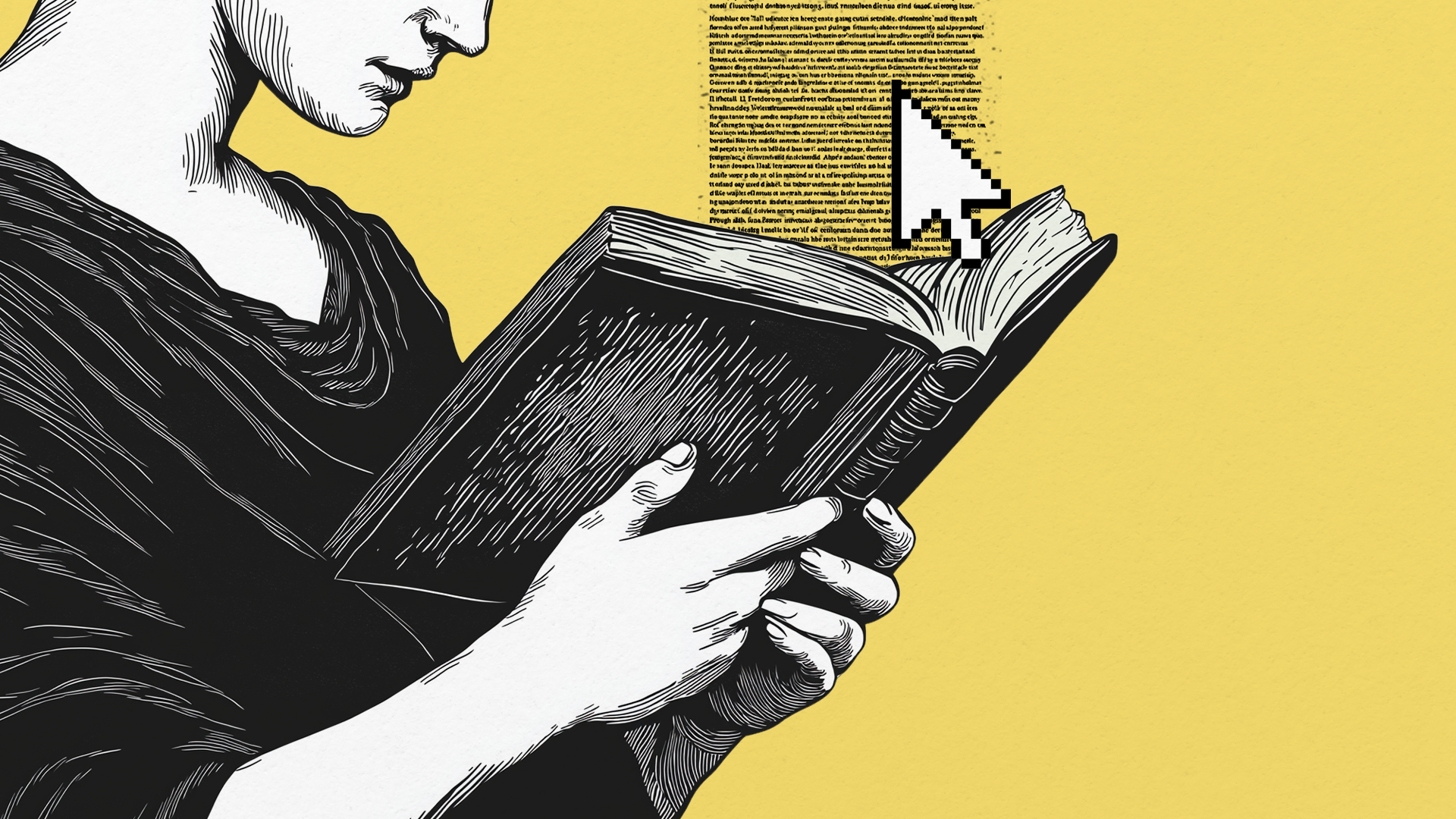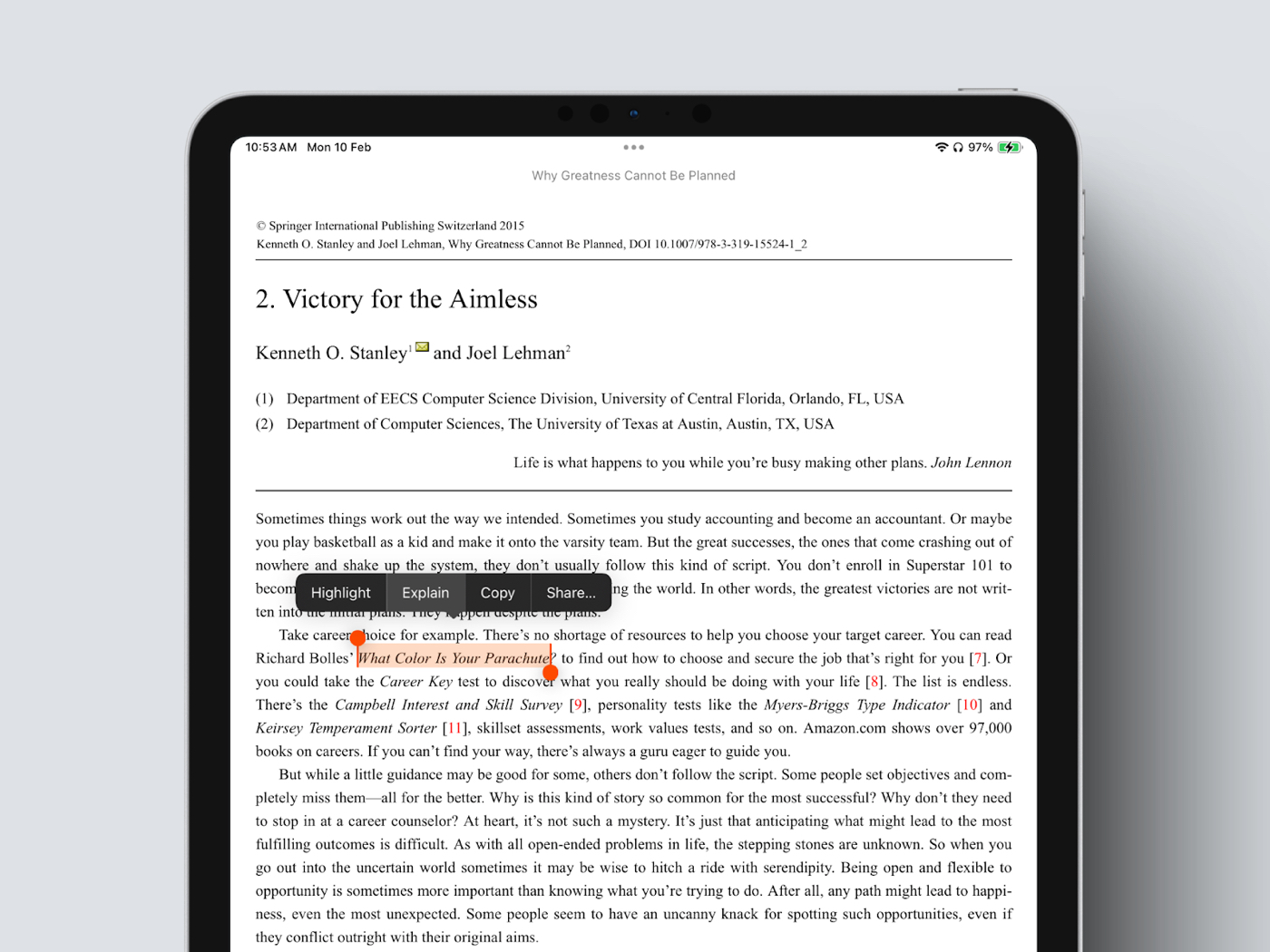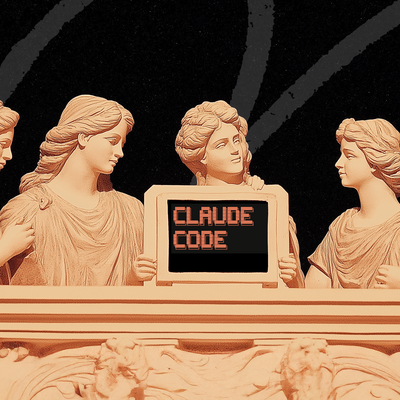
Update: We shut down the app, as it was an experiment. Thank you for your support.
TLDR: Today we’re sharing the latest experiment from Every Studio: Kairos, an AI-powered reading companion that helps you read more deeply, understand complicated concepts, and questions you on your comprehension. Kairos is built by our entrepreneur in residence (and the author of this piece) Naveen Naidu Mummana. Try it out on TestFlight and let us know what you think.—Brandon Gell
Was this newsletter forwarded to you? Sign up to get it in your inbox.
Something odd happens when you read with AI. You start having conversations with books.
I discovered this accidentally while reading on my iPad. I kept toggling between my ebook and ChatGPT, copying passages to ask questions. At first this felt like a hack—a messy workaround because reading apps haven't caught up to AI. But then I realized I was stumbling onto something more interesting: a fundamentally new way to read.
Having wrapped up my first experiment as an Every entrepreneur in residence, and with a little inspiration from an X post by computer scientist Andrej Karpathy, I decided to build a piece of software for myself: an AI-native reading tool I’m calling Kairos that would solve my own book-reading problems. Now, I’m testing how far I can push the reading experience when AI is built in from the ground up.
Speedreading the history of reading
Reading hasn't changed much since Gutenberg. Sure, we've moved from paper to pixels, but we still primarily consume text linearly, making highlights and notes just as readers did centuries ago. Digital reading platforms have mostly focused on distribution—making books more accessible through devices and online libraries. But the core activity of understanding what we read remains largely unchanged.
This seems especially strange given how much other forms of learning have evolved. We expect students to engage in discussion, not just listen to lectures. We know active learning beats passive consumption. Yet reading remains mostly solitary and one-directional.
AI changes this equation. Instead of just absorbing text, you can probe it. When you encounter a difficult passage, you can ask for clarification. When an idea reminds you of something else you've read, you can explore the connection. The text becomes a starting point for investigation rather than just information to absorb.
As I experimented with AI-assisted reading, I found myself asking a fundamental question: What does it mean to read well? The more I toggled between text and AI, the more I realized I needed a framework to understand how this technology was changing not just how we read, but the very nature of reading itself.
This search led me to Mortimer Adler, a philosopher and educator best known for his work on the Great Books movement, a project aimed at defining the essential works of Western civilization. In 1940, Adler published How to Read a Book, a guide to deeper reading that has remained influential for decades. His argument was simple: Most people read passively, skimming for information without truly engaging with the text. He outlined four levels of reading, each representing a more sophisticated way of understanding and interacting with books:
- Elementary—Basic comprehension. You’re just trying to understand what the words mean and follow along.
- Inspectional—A strategic skim. You get the gist by scanning the table of contents, reading a few key sections, and figuring out whether the book is worth a deeper dive.
- Analytical—Slow, deliberate reading. You break down the author’s argument, question their assumptions, and engage critically with the ideas.
- Syntopical—Reading across books. You pull in perspectives from multiple sources, compare arguments, and piece together a bigger picture.
Adler's framework provides a perfect lens to understand how AI can transform reading. To explore this, I built Kairos with an interface that feels familiar—similar to Apple Books—but with a crucial addition: an AI companion that's always ready to engage. The reading interface remains clean and focused, with a discrete AI button in the bottom left corner that opens up new possibilities for interaction. Tap it, and you'll find options to chat with Kairos, catch up on previous sections, or access chapter summaries—all while maintaining the full context of what you're reading.
The result feels less like traditional reading and more like having a knowledgeable friend reading alongside you. This friend never gets tired of your questions, has read practically everything, and can instantly recall relevant details from other books. It's the kind of reading experience previously available only to those with access to expert tutors or extensive personal libraries.
Let me walk you through how this works, using each of Adler’s reading levels as a guide.
Elementary: ‘Explain this’
The Only Subscription
You Need to
Stay at the
Edge of AI
The essential toolkit for those shaping the future
"This might be the best value you
can get from an AI subscription."
- Jay S.
Join 100,000+ leaders, builders, and innovators

Email address
Already have an account? Sign in
What is included in a subscription?
Daily insights from AI pioneers + early access to powerful AI tools









 Katie Parrott
Katie Parrott

Comments
Don't have an account? Sign up!
I think this is one of AI's killer applications. It will take some time until applications like that become the mainstream. This is why I think some people still underestimate the impact of AI and how it is really going to change everything.
Omigosh, I'm so in. I can't wait to see this product out in the wild.
In a Skool community, there was a whole discussion on using ChatGPT to interact with books we are reading. This takes it to the next level. Well done.
Great idea to read with narrator second voice, thoughtful partner or a guide to assess you're assimilating concepts as you read (students).
Are there options for Android or Windows?
@kiowasol Not yet! Right now Kairos is iOS-only through TestFlight. As this is still very much an experimental proof-of-concept, I'm focusing on refining the core experience before expanding to other platforms
Such a cool idea! I think the fear that was mentioned about AI making people lazy, is the concern that some people will strictly rely on summarizing works into a manageable concentrated chunk of knowledge that fits their needs. This could be good (what is War & Peace about?) or maybe less good (my assignment was to read this book, instead I'm taking the shortcut, but missing the detail, color, mood, etc.). I look forward to AI integration in my reading tools.
@dbuchter Thanks Drew! You're right about the tension between shortcuts and depth. But I believe reading tools can actually shape behavior - if we design them to encourage deep engagement rather than quick summaries, we can build better reading habits. That's exactly what I'm aiming for with Kairos - not replacing reading, but making it richer and more meaningful.
This sounds amazing! Using AI to transform our reading experiences in ways we've never imagined. Count me in for updates on the Kairos project.
@@theotao thank you!
Love the idea. I find myself in these spots of passive reading. Downloaded the TestFlight and have downloadedr a book in it! Excited to read it with Kairos!
@ajay_3395 Thanks for giving kairos a spin. Drop me a note about your experience!
@naveen_6804 is it possible to make the reading part easy? Perhaps increase the text size to fill up the blank space on the side and top bottom. I find myself too much zooming on each page.
How to I request TestFlight access?
i read about Kairos ai application. it does promises a lot. but i am not able to test it. because i do not use apple products like iphone, ipad, mac, etc. i will wait till it becomes available for other products.
Amazing article, concept and early stage product. Pondering the future of this.
Imagine you keep each book with the context of all your conversations with you as an expert so you can bring it back over time when needed. For example: Chris Voss' book on negotiation. Love it but don't feel like I need it immediately. Occasion arises, now I wish I had the book and all my notes with me.
Another one, we all have stuff we read and some stuff is really good and deserves a special place in our library. What does this all in aggregate mean for us? What can it tell us about ourselves? Would it be easy to spot gaps in knowledge? For example: This could help one find new books to read whilst avoiding an echo chamber or one could maybe understand oneself at a deeper level than any personality test could ever.
It says new testers aren't accepted at this time. @naveen_6804 What's the latest on Kairos?
Is there anyway to get into the beta still? The TestFlight link says it’s full.
I have plans for similar idea I’ve been making notes on. Interestingly also reading how to read a book as it was recommended by my kindle unlimited subscription and has integrated complexity value to other topics iMm writing in and things I’m building.